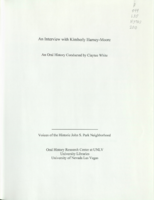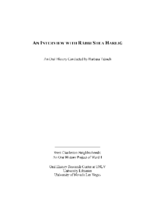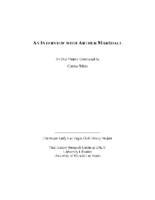Search the Special Collections and Archives Portal
Search Results

Transcript of interview with Cindy Coletti and David Fordham by Stefani Evans and Claytee White, October 27, 2016
Date
Archival Collection
Description
The interior of the green house at the end of the cul-de-sac envelops the visitor. Every room exudes comfort and encourages conversation even as the lake, lapping quietly on three sides of the house, beckons. Cindy Coletti revels in this house and its interiors, all of her own design, especially because they are so different from the daring, opulent, and award-winning custom homes for which she is known. Arriving in Las Vegas in 1988 as a single mother, Cindy immediately submitted a successful design for the first Southern Nevada Street of Dreams event and began networking. She established Sun West Custom Homes in Nevada by applying the design and contracting skills she had successfully honed by building nearly seventy houses in California, Florida, and Colorado—all the while grooming her son Danny—from the time he was in his teens—to eventually take over the company. In this interview, Cindy's husband, David Fordham, shares his background, his reasons for relocating to Las Vegas, work in commercial real estate, meeting Cindy, and living at The Lakes. Cindy then recalls the experiences that brought her to Las Vegas; shaped her ideas of self-help, friendship, design, and business, and instilled in her the confidence to succeed in a man's world. Cindy has retired from building and now enjoys traveling with her husband, but Sun West Custom Homes continues to thrive under the capable ownership and leadership of Daniel S. Coletti.
Text

Transcript of interview with F. Andrew Taylor by Claytee White, September 30, 2013
Date
Archival Collection
Description
F. Andrew Taylor has been a Las Vegas resident for over 20 years, moving to the city by way of New England and Georgia at the age of 28. Armed with a degree in painting from the Swain School of Design, got a job at a Laughlin casino as a caricature artist. After a brief stay in Laughlin and Bullhead City, Andrew moved to Ward I, where his girlfriend, now wife, lived. They soon moved to the Spring Valley area, where Andrew later learned through conversations with neighbors and his own research that the home sat on what was the old Stardust Racetrack. With Andrew’s move to the city came new professional opportunities. He got a job at CityLife as the in-house artist and graphic designer, what was then apart of Wick Communications. After a year, Andrew began reporting, initially working for the Sunrise/Whitney paper, and eventually working the downtown beat. Always feeling the pulse of the local arts and culture scene, he has attended First Fridays since it started, continues his own art,
Text

Transcript of interview with Ernie Hensley by Lisa Gioia-Acres, Janurary 25, 2008
Date
Archival Collection
Description
Ernie Hensley, an accomplished African American musician, was born in Washington D.C. on March 14 1940, the son of Ernest W. Hensley Jr. and Gladys Barbara Hensley. Both of his parents worked for the federal government in the nation's capital. Ernest W. Hensley Jr., was an employee at the Department of Defense and Gladys Barbara Hensley mother, who was an excellent pianist and drum major, ultimately set her musical career aside to provide for her family and worked for the National Labor Relations board. At the age of seven, after finding a saxophone in his grandmother's attic, Ernie embarked on his musical journey. He took lessons at the Modem School of Music in Washington D.C. Eventually acquired proficiency with the clarinet and the flute through long hours of practice. Ernie attended a historically black school, Armstrong High School in D.C., until he was transferred to integrated McKinley High School in 1954 following the Brown v. Board of Education ruling. Ernie recalls his experience in a new desegregated environment. After High School in 1957, Ernie joined the Air Force as a member of the 511th Air Force Band. In 1959 he resettled in France to play saxophone for the Air Force Band. Emie ultimately made a career in the Air Force. He had countless experiences of performing around Europe and in Washington D.C. at places like Constitution Hall. A dream came true when Emie was honored to become a member of the "Airmen of Note," the premier jazz ensemble for the United States Air Force. He retired from the Air Force in 1979. Because of his distinguished career in the United States Air Force, Emie had a number of opportunities once he retired from the military. He moved to Las Vegas in 1979 at age 39 and after living in area for just a few weeks, Emie started working with Johnny Haig 3 nights a week. Shortly thereafter, Emie found a long-term home working with Jimmy Mulidore's group at the Hilton for nearly a decade until 1995. Throughout Ernie's lifetime he has been fortunate to work with notable musicians such as Andy Williams, Sammy Davis Jr., Somers, Juliet Prowse, Steve an Eydie and his good friend Sarah Vaughn. Emie, along with his wife Carolyn, a retired UNLV faculty member, still resides in Las Vegas.
Text

Eddie Escobedo interview, February 25, 2019: transcript
Date
Archival Collection
Description
Interviewed by Maribel Estrada Calderón. Claytee White also participates in the questioning. Eddie Escobedo was born in 1961 and two years later, he and his family immigrated to the United States. He fondly remembers his father, Edmundo Escobedo. Escobedo is currently in charge of the newspaper that his father started, El Mundo Newspaper.
Text

Transcript of interview with Georgie Clark by Steven E. Pilgram, March 2, 1980
Date
Archival Collection
Description
On March 2, 1980, Steven E. Pilgram interviewed river runner, Georgie Clark (born on November 13, 1910 in Chicago, Illinois) at Sambo’s Coffee Shop in Las Vegas, Nevada. This interview is an in-depth discussion about the Colorado River area, including changes, and new rules and regulations. Georgie also recalls working as a real estate agent and as a ferry command, civil servant in World War II.
Text

Transcript of interview with Kimberly Harney-Moore by Claytee White, June 16, 2010
Date
Archival Collection
Description
Kimberly Harney-Moore and her three siblings were raised in the John S. Park Neighborhood in the 1960s and 1970s. Their parents, Tim and Kathleen Hamey, were educators. A nostalgic feeling for the neighborhood remains; perhaps, rekindled when she had close friends buy a house across the street from her childhood home. In this interview, Kimberly talks about the inviting character of the area's architecture, mentions a few names of neighbors she babysat for, and fondly recalls her job at Luv-Its Custard shop. There was a time when she would drive through the old neighborhood and be saddened by the lack of upkeep and the changes, but today it is a place being reborn to a new generation. Note: Tim Harney and Kathleen Harney, Kimberly parents, are also participants in the Voice of the Historic John S. Park Neighborhood oral history project.
Text

Transcript from interview with Sari and Paul Aizley by Barbara Tabach, November-December, 2015
Date
Archival Collection
Description
Paul and Sari Aizley discuss their many accomplishments as residents of Las Vegas, including those in education and with Jewish Family Service Agency.
Text

Transcript of interview with Todd S. Polikoff by Barbara Tabach, August 30, 2016
Date
Archival Collection
Description
In 2015, Todd S. Polikoff was named the President & Chief Executive Officer of the Jewish Federation of Las Vegas. (The organization is now known as Jewish Nevada). Todd is a graduate of Stockton University and earned his MBA at Cleveland State University. He has three children: Samuel, Shira and Jordan. Born in 1971 to a steelworker and hairdresser, Jack and Judy Polikoff, Todd grew up in Philadelphia, became a bar mitzvah there, and shocked his mother when he explained he was putting college on hold to move to Israel. In addition to stories about these life memories, Todd also traces his career path to decision-making to a meaningful trip to Moscow a where a defining moment helped him understand his own relationship with Judaism. To the time of this interview, Todd has invested over twenty years in leadership of Jewish Federation and AIPAC in states that include New Jersey, Delaware, Texas, Ohio and Nevada.
Text

Transcript of interview with Rabbi Shea Harlig by Barbara Tabach, March 5, 2014
Date
Archival Collection
Description
Interview with Rabbi Shea Harlig by Barbara Tabach on March 5, 2014. In this interview, Rabbi Harlig discusses the Chabad movement of Orthodox Judaism and establishment of Chabad centers in Las Vegas and Southern Nevada. Rabbi Harlig talks about the property he has acquired for Chabad, and its outreach programs, including supervision of kosher kitchens in hotels. This interview was conducted for the Ward 1: West Charleston Neighborhoods oral history project, and therefore includes zoning and neighborhood discrimination issues, and a tour of the property.
Rabbi Shea Harlig arrived in Las Vegas in 1990 and settled in the Artesian Heights neighborhood of Las Vegas. As Director of Chabad of Southern Nevada, Rabbi Harlig focuses on religious outreach, education and social services, and has helped establish seven Chabad locations throughout the community and also built a school and educational program of the highest standards.
Text

Transcript of interview with Arthur "Art" Marshall by Claytee D. White, February 11, 2014
Date
Archival Collection
Description
Interview with Arthur "Art" Marshall by Claytee White on February 11, 2014. In this interview, Marshall
Arthur Marshall was born in 1929 in Cleveland, Ohio. He met his wife, Jayn in 1953, and the couple moved to Las Vegas where she already lived with her family. Art joined his father-in-law in the family's retail clothing business. Art Marshall took over the retail clothing business with his brother-in-law, Herb Rousso, and expanded operations as Marshall-Rousso stores. Art quickly became very active in the Jewish community upon arriving in Las Vegas. He served as president at Temple Beth Sholom, and worked with other Jews in the city, many who owned and managed the hotels at the time, to build a strong Jewish community in Las Vegas. He served as the chairman of Nevada State Bank and spent 12 years on the Nevada Gaming Commission.
Text
